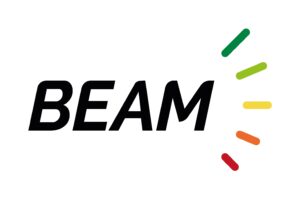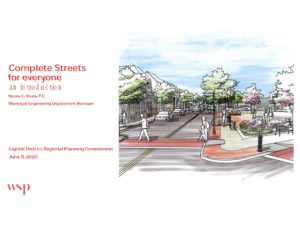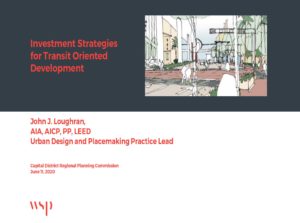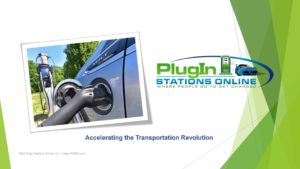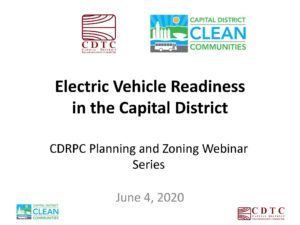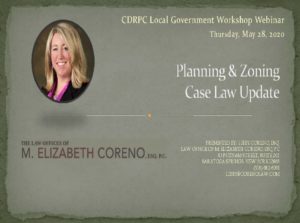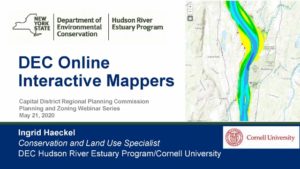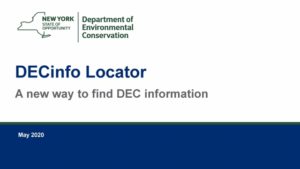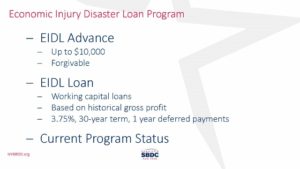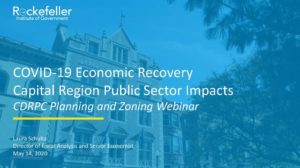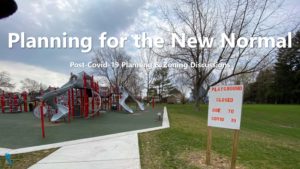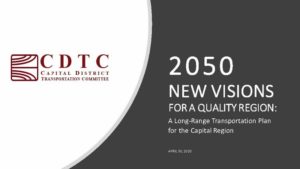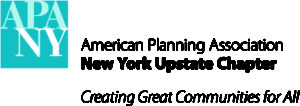CDRPC Planning and Zoning Webinar Series Archives
Funding Opportunities through the NYS Environmental Facilities Corporation
Since 1990 New York State Environmental Facilities Corporation (EFC) has provided financial assistance to municipalities across the State to fund water and sewer infrastructure projects. This presentation will discuss how to apply for low-cost funding through the Clean Water and Drinking Water State Revolving Fund (SRF) programs, federal and state program requirements, available grant programs, and provide information on upcoming federal infrastructure funding.
Leveraging Regional Partnerships to Engage Residents in Municipal Clean Energy Campaigns
Municipalities participating in NYSERDA’s Clean Energy Communities Program and utilizing the assistance provided by the CDRPC can leverage regional and local partnerships to engage residents in local campaigns that promote the adoption of clean energy technologies. Hear case studies from the City of Albany and other local municipalities on how they’ve used partnerships with clean energy organizations to successfully engage residents in community solar, heat pumps, energy efficiency, and electric vehicles campaigns and have been awarded grants and points through the Clean Energy Communities Program.
Adapting Planning Board Procedures for the Digital Age
With the switch to virtual meetings during the COVID-19 pandemic, Planning Boards throughout the state have been bridging the digital divide and finding creative ways to use digital technology to streamline reviews and improve transparency. For this session, the speakers will present a case study from the Town of Thompson (Sullivan County). In early 2021, Building Department staff and the Town’s planning consultant worked collaboratively to streamline Planning Board policies and review procedures, make the review process more understandable and transparent, and transition Planning Board members to an all-digital format for application review and meeting prep.
State Environmental Quality Review (SEQRA) Basics
This session will provide an overview of the intent and application of the State Environmental Quality Review Act (SEQRA).
Short-Term Rentals – Balancing Local Impacts and Economic Benefits
This session will offer a snapshot of local and regional STR markets, positive and negative impacts to local communities…
MS4 Permit Update
This presentation will highlight the proposed MS4 permit changes and impacts they will likely have on municipal operations.
Your Community and the Triple Bottom Line…
Ensuring Resiliency through Neighborhood, Financial, and Environmental Health
Planning, Zoning & Controversial Development
Our session will address best planning and zoning practice in the shadow of controversial development proposals, as well as strategies…
Marijuana Planning and Zoning Panel
This session will provide an overview of the provisions of the law that will impact planning and zoning decision making, highlight discretion communities have implementing the law, foreshadow the regulatory landscape and explore lessons learned from other states that have initiated recreational pot.
Planning Case Law Update
The goal of this session is to provide guidance on how to prepare an administrative record to withstand an Article 78 challenge…
CapitalRegionIndicators.org and Other Data Tools and Resources
Capital Region Indicators is a joint initiative of the Capital District Regional Planning Commission (CDRPC), Capital Region Chamber, The Community Foundation for the Greater Capital Region and the Capital District Transportation Committee. This initiative seeks to help a wide variety of public and private organizations better understand the communities of New York’s Capital Region. Using the best available information, the website serves as a common source for data and interactive visualizations that will inform community members on critical topics related to the economic and social health, as well as progress of our region.
The purpose of NY’s Capital Region Indicators is to:
- Provide high quality, reliable, objective and up-to-date data
- Spur discussion about and build consensus around our region’s key indicators
- Help better understand changes in our communities’ well-being over time to better target investments to address chronic and emerging challenges and community needs
- Provide information relevant to community and regional planning
- Serve as a key resource for data needed for grant applications and reports developed by public and private organizations
The site was custom-designed by the Albany Visualization and Informatics Lab (AVAIL) located in the Geography and Planning Department at the University at Albany, State University of New York, and is maintained by CDRPC.
Capital Region Indicators https://www.capitalregionindicators.org/
Economic Recovery Dashboard https://cdrpc.org/covidrecoverydashboard
Data on CDRPC’s Website
- Community Fact Sheets https://cdrpc.org/data/cfs
- Community Growth Profiles: https://cdrpc.org/programs/land-use-transportation/community-growth-profiles
- Capital Region Atlas 2020: https://cdrpc.org/atlas
- Building Permits
- Consumer and Producer Price Index
- Employment, Unemployment, and Unemployment Rate
- Regional Gross Domestic Product
- Capital District Youth Center Usage
- Cost Of Living Index
- Total Sale Tax Revenue by County
- Weekly Unemployment by Industry
- Weekly Unemployment Claims by County 2019 vs 2020
“Comprehensive Plans: Gaining a Competitive Advantage for Your Community”
Presenting Sponsor The MRB Group
View Presentation Archive PDF Here
Many communities do not have a strong, practical and useful comprehensive plan. MRB Group’s SmarterlocalGov team works to strengthen municipal leaders and teams, and advocates planning practices as a community-building process. This session will discuss why a comprehensive plan is beneficial, what’s inside a good comprehensive plan, and how it can affect your community’s ability to succeed. We will also share tools we utilize in planning processes that can be extremely useful in a number of municipal activities.
Speakers: Diana Smith, Senior Municipal Advisor and Nicholson, AICP, CFM
“Delivery Models for Resilience: A Case Study for New York’s Great Lakes Basin”
Presenting Sponsor Bergmann
View Presentation Archive Here
View additional resources here
As a result of the record high-water levels on Lake Ontario and the associated flooding and erosion in 2017 and 2019, the NYSDOS Coastal Lakeshore Economy and Resiliency (CLEAR) Initiative is a new community engagement process that will support local communities in New York’s Great Lakes – St. Lawrence River region and educate stakeholders about flood and erosion risk in order to promote a comprehensive resilience strategy. Success in the long-term implementation of this planning initiative, as in most plans, largely depends on the local governments–and the lack of resources and organizational capacity are traditionally cited as obstacles. As the CLEAR Initiative begins, Bergmann looks to other models in New York State that support adaptation and resilience, such the Hudson River Estuary Program, to encourage innovative approaches to collaboration, partnerships, and long-term service delivery for New York’s Great Lakes region.
“Review Board Procedures The Who, What & How to Achieve Development Success”
Presenting Sponsor Barton and Loguidice
View Presentation Archive Here
A comprehensive overview for municipal review boards, staff, elected officials, and the general public outlining the roles, procedures, and most importantly, parameters of influence on typical development review applications. Keeping attendees awake and engaged, this session will utilize interactive tools to challenge one’s understanding of their role and reinforce best practices. We will work through sample applications to demonstrate how to leverage review processes to avoid the “bad” and successfully achieve their community’s future development vision. Topics will include NYS Law requirements, site plans, special permits, variances, rezonings, and the significance of local plans and codes in guiding these procedures.
“Engaging the Public in the COVID-19 Era – Lessons Learned from the “New Normal”
Presenting Sponsor The MRB Group
View Presentation Archives Here.
MRB Group’s SmarterLocalGov team is involved in many forms of public outreach and engagement, including community-wide planning, and supporting Zoning Board and Planning Board Meetings, as well as public education efforts. Local government exists for its citizens! In the new “COVID era,” there is an even greater need to encourage residents to stay engaged. This workshop will discuss ways to encourage enhanced participation, despite the current challenges. We will also share some mishaps we’ve witnessed along the way — and how creative ways to engage the public requires equally creative measures to protect public engagement.
“Achieving Sustainability through Infrastructure Planning”
Presenting Sponsor Delaware Engineering
Presentation Materials Archived Here.
The availability of centralized water and sewer infrastructure is often a determining factor for future growth, particularly in rural areas. Long-range infrastructure planning combined with thoughtful land use regulations can be a useful tool for communities to target growth and development into areas with the capacity to support greater density while minimizing environmental impacts. Using case studies from throughout New York State, this session will cover what goes into developing an “Infrastructure Master Plan” and why it is important.
“Not In My Backyard: Community Opposition to Land Use Applications”
Presentation Materials Archived Here.
Resource Material Archived Here.
It’s not Mister Rogers’ Neighborhood anymore. Our open discussion will address the legal fine points and ever-changing role of NIMBY-ism in land use review, the rise of social media information, FOIL, and legal standing.
“Farm Friendly Zoning to Increase Agricultural Resiliency”
Presenting Sponsor Community Planning & Environmental Associates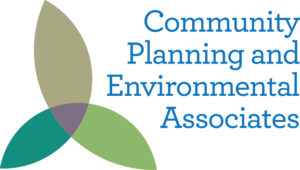
Presentation Materials Archived Here.
Local land use regulations can have many consequences to agriculture and they can affect the ability of farms to maintain themselves or grow. Learn what farm friendly zoning looks like and why it is important to evaluate your local laws with an eye towards agriculture. This session will explore farm friendly audits, consistency between comprehensive plans and local laws, and farm friendly tools you can use to increase the resiliency and sustainability of farms in your community.
“Building a Walkable & Accessible Capital Region for All”
Presentation Materials Archived Here.
This session will provide an overview of the Capital District Transportation Committee’s (CDTC) long-range plan, New Visions 2050, recommendations for building more walkable communities and why this is important for creating a more equitable, healthy, accessible, and quality region. The overview will identify specific strategies identified in New Visions 2050 and how CDTC is working with local governments to implement them.
“Planning Infrastructure for Natural Resiliency & Green Solutions”
Presenting Sponsor The Laberge Group
Presentation Materials are Archived Here.
 Threats of environmental degradation from climate change are prompting planners to reduce the carbon impact and promote functional and resilient infrastructure. Infrastructure is taking new forms, using naturalistic elements and green solutions through designs that anticipate and address the effects of severe heat, drought, and even potential wildfires, as well as ensuring post-development stormwater flows do not contribute to flooding. In addition to control of onsite stormwater quality and quantity, we will explore ways that natural systems approaches can be cost-effectively deployed to manage energy use and enhance functional site designs to establish beneficial onsite arrangements and complement neighborhood and ecological form. This webinar will examine evidence, case studies, and practice recommendations to assist the development of infrastructure containing higher amounts of natural features and a rubric of green solutions.
Threats of environmental degradation from climate change are prompting planners to reduce the carbon impact and promote functional and resilient infrastructure. Infrastructure is taking new forms, using naturalistic elements and green solutions through designs that anticipate and address the effects of severe heat, drought, and even potential wildfires, as well as ensuring post-development stormwater flows do not contribute to flooding. In addition to control of onsite stormwater quality and quantity, we will explore ways that natural systems approaches can be cost-effectively deployed to manage energy use and enhance functional site designs to establish beneficial onsite arrangements and complement neighborhood and ecological form. This webinar will examine evidence, case studies, and practice recommendations to assist the development of infrastructure containing higher amounts of natural features and a rubric of green solutions.
“Clean Energy and Your Comprehensive Plan: Guidance for Local Governments”
Presentation Materials archived Here.
NYSERDA will discuss a new resource for municipalities looking to incorporate clean energy goals and objectives into their comprehensive plans. Whether your community is looking to modify an existing plan, create a separate clean energy plan component, or build a new comprehensive plan from scratch, this session will introduce key considerations and resources to ensure responsible planning for clean energy development.
“Drinking Water Source Water Protection and The Role of Watershed Rules and Regulations”
Presentation Materials archived Here.
Protecting public drinking water at its source is among the most important aspects of long term health of a community, and yet many communities don’t realize how many gaps there are in existing laws that can allow for degradation. In recent years, several New York communities have suffered from harmful algal blooms, toxic contamination or other consequences of inadequately protected drinking water supplies with significant health and economic impacts. Watershed Rules and Regulations allow for specific protections tailored to a water supply’s particular risks. In many New York State communities, Watershed Rules Regulations date to the early in the 20th century and are inadequate for mitigating risks from modern development and land use activities. Further complicating water quality protection efforts, many municipally-owned drinking water sources are located outside their municipal boundaries, making administration and oversight of land use controls difficult, if not impossible. Updated Watershed Rules and Regulations can fill existing regulatory gaps to better protect public water supplies, and are one important tool in developing robust and effective drinking water source protection programs. The Capital District Regional Planning Commission, together with the Cayuga County Department of Planning & Economic Development and Riverkeeper will present a roundtable discussion on ongoing efforts to update Watershed Rules and Regulations and share strategies from ground-up watershed planning to building a constituency for water quality.
“Open Streets in the Capital Region, Opportunities out of COVID Challenges”
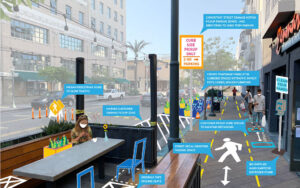 Communities across the US and around the world are remaking their streets, sidewalks and outdoor space in response to COVID challenges. Hear about trends around the country, and how two Capital Region communities were able to quickly pivot and provide “streateries”, recreation, and public art on their local streets. Open street possibilities also exist for NYS routes with NYSDOT’s permitting process and will be discussed.
Communities across the US and around the world are remaking their streets, sidewalks and outdoor space in response to COVID challenges. Hear about trends around the country, and how two Capital Region communities were able to quickly pivot and provide “streateries”, recreation, and public art on their local streets. Open street possibilities also exist for NYS routes with NYSDOT’s permitting process and will be discussed.
Post COVID will this popular activity continue? The potential for permanent activities in the future were also highlighted.
Presenters: Katie Hammon, Executive Director of the Troy BID, Chris Spencer, Commissioner of Development and Planning for the City of Albany and Liz Kormos, Village of Ballston Spa Trustee.
Presentation archives are available below. A video of the presentation is available here.
“Assessing Green Infrastructure: Kingston’s Uptown Parking Lots”
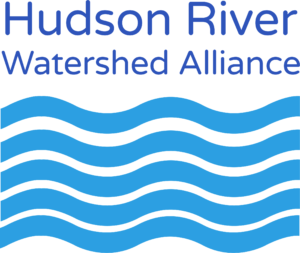 Green infrastructure is an important tool to manage stormwater and reduce runoff. This study focused on assessing the performance of 13 different green infrastructure practices in 2 parking lots in the City of Kingston in 2017. The study included a quantitative assessment of water level and infiltration in 10 of the practices (bioretention areas, rain gardens, and dry wells) from May-November 2017. Frequent visual observations provided context for water level
Green infrastructure is an important tool to manage stormwater and reduce runoff. This study focused on assessing the performance of 13 different green infrastructure practices in 2 parking lots in the City of Kingston in 2017. The study included a quantitative assessment of water level and infiltration in 10 of the practices (bioretention areas, rain gardens, and dry wells) from May-November 2017. Frequent visual observations provided context for water level “Application of GIS for Municipal Infrastructure Planning & Water Resource Protection”
This webinar was made possible by generous support for the Chazan Companies
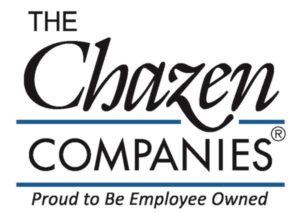 Geographic Information Systems (GIS) are widely used by the planning community throughout the Capital Region to inventory critical infrastructure, monitor land use changes, and mitigate water quality related impacts. This Webinar highlighted examples from communities using a ‘smart cities’ approach to mapping and monitoring municipal sewer, water, and stormwater infrastructure in order to allocate resources, staff, and for capital planning. This webinar also explored how communities are using GIS to map where private sewer systems may have a potential impact on nearby water sources. Lastly, it examined how GIS is being used for modeling potential stormwater quality issues at the watershed scale and help to identify potential mitigation strategies.
Geographic Information Systems (GIS) are widely used by the planning community throughout the Capital Region to inventory critical infrastructure, monitor land use changes, and mitigate water quality related impacts. This Webinar highlighted examples from communities using a ‘smart cities’ approach to mapping and monitoring municipal sewer, water, and stormwater infrastructure in order to allocate resources, staff, and for capital planning. This webinar also explored how communities are using GIS to map where private sewer systems may have a potential impact on nearby water sources. Lastly, it examined how GIS is being used for modeling potential stormwater quality issues at the watershed scale and help to identify potential mitigation strategies.
This Webinar has been submitted for 1 hour of of AICP Credits.![]()
Presenters: Paul Cummings, AICP, LEED, AP and Ethan Gaddy, AICP, The Chazan Companies
Presentation archives will be available soon. A video of the presentation is available here.
“Complete Streets and TOD”
 Complete streets and transit oriented development (TOD) are distinct but related topics. TOD is a way of developing that is intended to encourage not just greater transit usage, but also increased walking and cycling. For this to be not just practical, but attractive to a wide audience, the streets in and around any TOD must connect to transit and be built to accommodate all modes.
Complete streets and transit oriented development (TOD) are distinct but related topics. TOD is a way of developing that is intended to encourage not just greater transit usage, but also increased walking and cycling. For this to be not just practical, but attractive to a wide audience, the streets in and around any TOD must connect to transit and be built to accommodate all modes.
Complete streets are growing in popularity around New York State as a way to improve the quality of life in our communities as well as develop our multi-modal transportation system. This presentation provided an introduction to the role of Complete Streets programs in the social life of the community and how they allow for public gather spaces and recreation and include descriptions of several recent projects in eastern New York.
TOD offers a wide variety of benefits to communities interested in providing adequate housing for their residents at lower environmental, social, and economic costs.
While TOD is traditionally associated with heavy or light rail, the trend is towards TOD built around Bus Rapid Transit systems. This presentation introduced TOD, discussed some of its benefits, and highlighted the strategies necessary to achieve successful projects.
Presenters: John Loughran and Nicole Shute, WSP USA
This webinar was made possible by generous support from WSP USA.
A video archive of the presentation can be accessed here. Presenter slides are available below.
“Electric Vehicle Charging Infrastructure”

Electric vehicles have gone mainstream and the growing demand for public charging access will significantly impact municipal planning activities. Whether your jurisdiction is considering providing public charging resources for your residents or adding electric vehicles to your fleet this webinar demonstrated the benefits of developing a robust network of charging resources. Highlighting local municipal and commercial projects PlugIn Stations Online demonstrated the value of EV charging infrastructure in your community as well as an example of associated permitting and code requirements adopted by local governments.![]()
The second part of the program summarized highlights from the Capital District Zero Emission Vehicle Plan (2019) developed by the Capital District Clean Communities Coalition. Key topics included trends in EV ownership and charging station infrastructure, barriers and opportunities to EV adoption, and EV readiness in the Capital District.
Speakers: Ron Semp, Director of Commercial Sales for PlugIn Stations Online
Jacob Beeman, Transportation Planner for the Capital District Regional Planning Commission
This Webinar was made possible by generous support from PlugIn Stations Online.
“Planning Case Law Update”
![]() This session offered the latest information on New York courts as they reviewed and issued decisions on a wide variety of land use approvals and denials. If you were looking for insight into how courts thought about and assessed local planning and zoning decisions, this session provided you a close look at the laws and standards that are applied to both approvals and denials issued by your board. The session highlighted teachable cases from across the state which aim to provide a framework of land use law that can become usable by a planning or zoning board members.
This session offered the latest information on New York courts as they reviewed and issued decisions on a wide variety of land use approvals and denials. If you were looking for insight into how courts thought about and assessed local planning and zoning decisions, this session provided you a close look at the laws and standards that are applied to both approvals and denials issued by your board. The session highlighted teachable cases from across the state which aim to provide a framework of land use law that can become usable by a planning or zoning board members.
“DEC Online Interactive Mappers”
 This webinar detailed two online interactive mappers available from the NYS Department of Environmental Conservation (DEC): DECinfo Locator and the Hudson Valley Natural Resource Mapper. Launched to the public in 2019, DECinfo Locator is an interactive mapper with more than 65 interactive data layers, allowing users to download permits, view former industrial site cleanup plans, see water quality reports and much more, based on where they live, work, or play. The Hudson Valley Natural Resource Mapper was launched in 2018 and contains over 40 interactive data layers identifying important habitats, water resources, and scenic and recreation areas in the 10-county Hudson River Estuary watershed. Presenters will provide demos of both mappers highlighting layout and functions and will discuss recently added data and applications of the maps for local planning. This webinar has been submitted for a one (1) AICP Credit.
This webinar detailed two online interactive mappers available from the NYS Department of Environmental Conservation (DEC): DECinfo Locator and the Hudson Valley Natural Resource Mapper. Launched to the public in 2019, DECinfo Locator is an interactive mapper with more than 65 interactive data layers, allowing users to download permits, view former industrial site cleanup plans, see water quality reports and much more, based on where they live, work, or play. The Hudson Valley Natural Resource Mapper was launched in 2018 and contains over 40 interactive data layers identifying important habitats, water resources, and scenic and recreation areas in the 10-county Hudson River Estuary watershed. Presenters will provide demos of both mappers highlighting layout and functions and will discuss recently added data and applications of the maps for local planning. This webinar has been submitted for a one (1) AICP Credit.
“COVID-19 Economic Recovery- Capital Region Public Sector Impacts”
As COVID-19 continues to take its toll on American lives, it also continues to wreak havoc on local business and economies.
Our panel looked at some of the economic impacts in the Capital Region, SBA and other federal funding assisting businesses, and what municipalities need to be thinking about as the Capital Region prepares to re-open. Hint: It won’t be back to business as usual. COVID-19 recovery will require creative collaboration and problem-solving, and doing things differently than they’ve been done before.
Local elected or appointed officials, staff and private business are all invited to attend this webinar focused on the Capital Region public sector economy.
Speakers: Kate Baker from the NYS Small Business Development Center at the University at Albany, Laura Schultz from the Rockefeller Institute, and Shelby Schneider from Saratoga County Prosperity Partnership
A video archive for this webinar can be accessed here. Presenter slides are below.
“That’s Not What I Thought I Approved”
 In this webinar, presenter Nicole Allen, Planning Services Manager, AICP, Laberge Group, shared stories and perspective on situations (and remedies) when what’s presented for approval differs from what’s ultimately constructed. This webinar has been submitted for a one (1) AICP Credit.
In this webinar, presenter Nicole Allen, Planning Services Manager, AICP, Laberge Group, shared stories and perspective on situations (and remedies) when what’s presented for approval differs from what’s ultimately constructed. This webinar has been submitted for a one (1) AICP Credit.
Ms. Allen is a seasoned manager with 20 years of experience in developing and managing a wide range of planning projects and has overseen the successful procurement and administration of over $65 million in grant funding for communities across New York State.
This webinar has been submitted for a one (1) AICP Credit. The webinar was recorded and may be accessed here (leaves CDRPC website). A PDF of the presentation is provided below. This Webinar was was made possible by the generous sponsorship from the Laberge Group
“COVID-19 Impacts on Transportation and Migration Patterns”
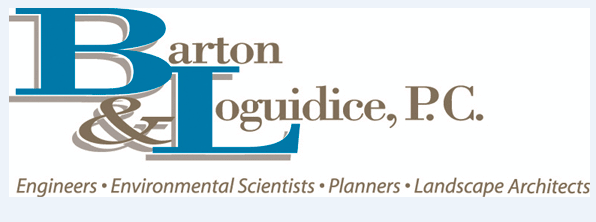 Presenters from Barton & Loguidice and the Capital District Regional Transportation Committee shared perspectives on population, development and transportation trends before and during the COVID-19 crisis. They also provided some perspective on what the post COVID-19 landscape may look like.
Presenters from Barton & Loguidice and the Capital District Regional Transportation Committee shared perspectives on population, development and transportation trends before and during the COVID-19 crisis. They also provided some perspective on what the post COVID-19 landscape may look like.
These presentations have been archived below. A video of the webinar can be accessed here. Click an image below to open a PDF copy of the presentation.

